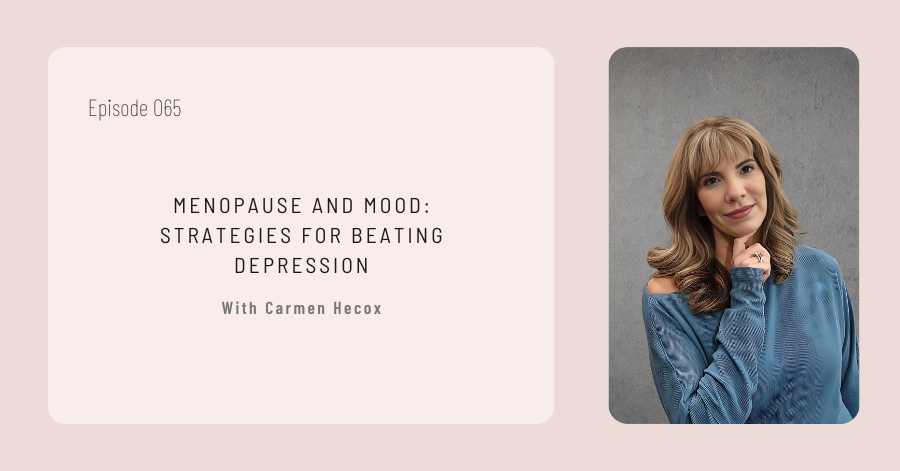Menopause and Mood: Strategies for Beating Depression
Discover How to Conquer Depression During Menopause with Insight and Action
Have you ever felt like menopause is more than just a biological transition, perhaps even an emotional revolution? If this resonates with you, you're in the right place. Today, we're delving into a topic many might shy away from—depression during and after menopause. It's time to shed light on this shadow, dismantle the stigma, and empower ourselves through this significant life transition.
Understanding the Emotional Impact of Menopause and Mood
Menopause is often portrayed simply as a series of physical health events—a narrative dominated by symptoms like hot flashes and hormonal changes. However, the reality is that it encompasses much more. This life stage can provoke a complex array of emotional reactions that mirror the deep internal changes occurring. As hormone levels fluctuate, so too can our emotional states, often leading us to confront unresolved issues or reevaluate our life choices. This period can act as a catalyst for significant emotional and psychological growth, but it can also bring forward feelings of uncertainty and instability.

Reflecting on Life's Path
During menopause, many women find themselves reflecting on the past, reassessing life decisions, and contemplating roads not taken. This can often lead to a sense of regret or nostalgia for what might have been. It's not uncommon to question major life choices—career paths, relationships, or even parental decisions—under the new light of current wisdom and life experience. This introspection can be painful yet also offers a chance for reconciliation with one's past and an opportunity to forge a path towards greater fulfillment in the future. It's a time when the should-haves and could-haves come to the forefront, prompting a need for understanding and, potentially, redirection.
The Echo of Loneliness
As we transition through menopause, changes in our social environment can become markedly pronounced. Children may leave home, career dynamics might shift as retirement approaches, and there could be a decrease in the number of daily social interactions that once filled the calendar. This can lead to a profound sense of loneliness, where the quiet of an increasingly empty house feels louder than ever. This ‘echo of loneliness' is not just about physical solitude; it reflects a deeper sense of disconnect from a previously familiar life structure. It challenges one to find new ways to connect and maintain meaningful relationships, emphasizing the importance of nurturing friendships and community ties that resonate with this new phase of life.
Facing Our Mortality
Menopause also brings with it an acute awareness of aging. For many, this is the first time they might confront their own mortality in a tangible way. The changes in physical appearance and function can be stark reminders of the passing of time and the inevitability of aging. In a society that often values youth above all, this can trigger a crisis of identity and self-worth. Yet, this confrontation also offers an opportunity to redefine what aging means on a personal level. It can be a time to celebrate the wisdom gained from life experiences, to embrace a new kind of beauty, and to assert a renewed sense of purpose that transcends the physical signs of aging.
By navigating these emotional landscapes with awareness and support, menopause can transform from a period of uncertainty to one of profound personal growth and discovery.

Signs of Depression During Menopause
Recognizing depression during menopause can be challenging, as it often disguises itself behind the veil of normal menopausal symptoms or the expected stressors of midlife changes. However, there are specific indicators that can help distinguish it from typical menopausal experiences. These symptoms of depression are not just fleeting; they are persistent and impactful, affecting daily function and quality of life.
Persistent Exhaustion
One of the hallmark signs of depression during menopause is a profound sense of exhaustion that isn’t relieved by rest. This type of fatigue is both physical and emotional. Women may report feeling physically drained, even after a full night's sleep, and may find it difficult to muster the energy for routine tasks. This exhaustion can be demoralizing and pervasive, affecting every aspect of life from personal care to professional responsibilities. It's an exhaustion that feels as though it's weighing you down, making even small tasks feel disproportionately difficult.
Unexplained Aches and Pains
Depression during menopause can also manifest physically in the form of unexplained aches and pains. These symptoms are often dismissed as just another part of aging or menopause itself. However, they can be indicative of deeper emotional distress. Women might experience joint pain, muscle aches, or general discomfort that doesn’t seem to have a clear medical cause. These physical manifestations of depression are important to recognize because they can exacerbate the cycle of depression, where pain leads to increased inactivity, which in turn can deepen feelings of depression.
Withdrawal from Social Life
A significant red flag for depression is a noticeable withdrawal from social life. During menopause, it's not uncommon for women to introspect more and perhaps choose solitude at times. However, when this behavior changes from a choice to a compulsion—avoiding interactions, skipping social gatherings that used to bring joy, or consistently ignoring calls from friends—it may signal depression. This withdrawal is often due to the overwhelming effort it feels to engage with others or a perceived inability to relate to them as before. The isolation that ensues can create a feedback loop, intensifying feelings of loneliness and sadness, further embedding the depressive state.
Understanding these signs of depression is crucial in seeking timely intervention and support. By recognizing these symptoms early, strategies can be implemented to address them, potentially mitigating their impact and improving overall well-being during this transformative phase.
Join our community
Connect with like-minded individuals.

Strategies for Overcoming Depression in Menopause
Addressing depression during menopause requires a multifaceted approach that combines lifestyle adjustments, community support, and professional intervention. By adopting a holistic strategy, women can significantly enhance their emotional resilience and improve their quality of life during this transitional period.
Foster Connections
One of the most effective ways to combat depression is to foster connections with others. Maintaining a strong social network can provide emotional support and decrease feelings of isolation. Here are a few ways to strengthen social ties:
- Reach Out to Friends and Family: Simple acts of communication, like regular phone calls or text messages, can keep relationships strong and provide a vital outlet for sharing feelings and concerns.
- Join Support Groups: Participating in groups with those who are experiencing similar life changes can validate personal experiences and provide comfort. Many communities and online platforms offer menopause-specific groups where members share strategies for managing symptoms and supporting emotional health.
- Volunteer: Engaging in volunteer work can not only help others but also expand one's social network and instill a sense of purpose and belonging.
Prioritize Self-Care
Self-care is crucial for mental health, especially during the hormonal changes of menopause that can affect mood and emotional well-being. Effective self-care strategies include:
- Routine Activities: Incorporating enjoyable activities into daily life, such as reading, gardening, or crafting, can provide a sense of normalcy and joy.
- Mindfulness and Meditation: These practices help manage stress and anxiety by focusing on the present moment and cultivating an attitude of acceptance.
- Healthy Sleep Habits: Ensuring adequate sleep is fundamental to managing mood swings and emotional distress. Establishing a relaxing bedtime routine can improve sleep quality.
Seek Professional Help
There is significant strength in recognizing when professional help is needed to manage depression:
- Consult Healthcare Professionals: Discussing symptoms with a doctor can lead to effective treatment plans, which may include hormone replacement therapy, antidepressants, or other medications.
- Therapy: Talking therapies, such as cognitive behavioral therapy (CBT), are highly effective in treating depression by helping individuals change negative thought patterns and develop coping strategies.
- Telehealth Services: For those with access limitations, many therapists offer online sessions, making it easier to receive support without the need to travel.
Embrace Physical Activity
Physical activity is a powerful tool for combating depression. The benefits extend beyond physical health, impacting mood and mental well-being significantly:
- Regular Exercise: Activities like walking, swimming, or yoga can boost endorphins, improve sleep, and reduce stress.
- Engage in Group Sports: Joining a sports club or group fitness class can provide both physical exercise and social interaction, enhancing the benefits.
- Connect with Nature: Spending time outdoors in natural settings has been shown to reduce symptoms of depression and anxiety. Activities like hiking, biking, or simply walking in a park can be therapeutic.
By integrating these strategies into everyday life, women navigating menopause can not only manage the symptoms of depression but also enhance their overall well-being and enjoyment of life during this significant life phase.

Inspirational Stories of Resilience
As we navigate the complexities of menopause, the real-life stories of those who have faced similar challenges can be incredibly empowering. These narratives not only provide practical ideas but also offer hope and a sense of shared experience.
Susie's Journey from Anxiety to Empowerment
Susie Maldonado's story is particularly inspiring. Facing significant anxiety during a major life transition, which included a career shift and the loss of a loved one, Susie found strength through practices like journaling and breathwork. These techniques helped her focus on the present and manage her thoughts more effectively, leading to a profound shift in her perspective. She embraced the motto “Grow,” “God Rewards Our Work,” which propelled her from a state of anxiety to one of empowerment. Today, Susie shares her journey through her podcast “Believe with Susie,” inspiring others with her story and the lessons she learned.
Cortney's Transformation: Living by Your Own Design
Another noteworthy story is that of Cortney McDermott. Once a high-flying corporate executive, Cortney felt unfulfilled despite her outward success. Her journey of self-discovery began when she chose to step back and reassess her life's priorities, focusing on self-care and authenticity. This decision led to a remarkable transformation, both internally and in her external life. Cortney's story highlights the importance of listening to one’s inner needs and the powerful impact of living a life aligned with one's true self. She now motivates others to remove their metaphorical masks and live authentically through her book “Give Yourself Permission” and as a life coach.
Personal Reflection: From Dark to Light
Sharing a piece of my own journey, I faced a profound challenge when I lost my father. The grief seemed manageable at first, but over time I realized it had enveloped me in a fog of sadness that affected all aspects of my life. It wasn't until I actively sought to engage with my feelings—taking walks, listening to uplifting music, and embracing the support of my loved ones—that I began to see light again. This experience taught me the importance of acknowledging our emotions and actively seeking paths for healing and joy.
Wrapping Up
These stories remind us that while menopause can introduce challenges like depression, it also offers an opportunity to rediscover and realign with our deepest selves. Through community support, personal reflection, and proactive self-care, we can navigate this phase with grace and strength.
As we conclude today's discussion, remember that the journey through menopause, while challenging, can be navigated with resilience and empowerment. Embrace the community, prioritize self-care, seek professional help when needed, and stay active to manage and even thrive during this transformative time. If you've found this discussion enlightening and helpful, consider subscribing for more insights and shared experiences that can help you navigate life's transitions. Let’s continue to learn and grow together!
Watch the complete episode here.

Resources Mentioned:


Thriving in Midlife: Transformative Secrets
Redefining Success: Cortney McDermott's Authentic Path
Subscribe to Apple Podcasts, and don't forget to Rate and Review
Like what you heard? If so, please rate and comment on Apple Podcasts. And while you are there, let me know what you want to hear next.
And while you are there, don't forget to hit Subscribe.


